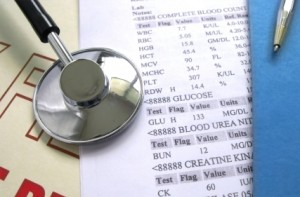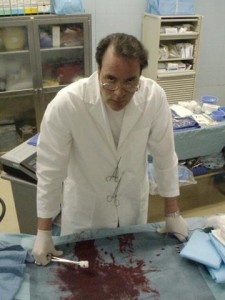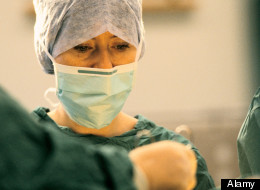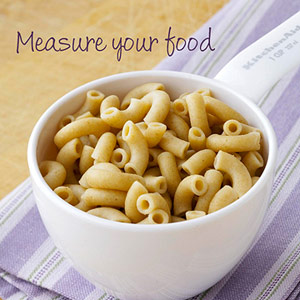July 25th, 2012 by Dr. Val Jones in Health Tips, Opinion, True Stories
Tags: DTC, EMR, Lab Tests, NYT, Pathology, Patient Empowerment, Results, Should Patients Get Their Lab Test Results Before Their Doctor?
6 Comments »
 Six weeks ago I had a skin lesion removed by a plastic surgeon. About 7 days after the biopsy, I received a letter from the pathology lab where the sample had been analyzed under a microscope. I eagerly opened the letter, assuming that it contained test results, but was disappointed to find a bill instead. As a physician, it felt strange to be in a position of having to wait for a colleague to give me results that I was trained to understand for myself. However, I knew that in this case I was wearing my “patient hat” and that I’d need to trust that I’d receive a call if there was an abnormality. I haven’t received a call yet, and I assume that no news is good news. But what if no news is an oversight? Maybe there was a communication breakdown between the path lab and the surgeon (or his office staff) and someone forgot to tell me about a melanoma? Unlikely but possible, right?
Six weeks ago I had a skin lesion removed by a plastic surgeon. About 7 days after the biopsy, I received a letter from the pathology lab where the sample had been analyzed under a microscope. I eagerly opened the letter, assuming that it contained test results, but was disappointed to find a bill instead. As a physician, it felt strange to be in a position of having to wait for a colleague to give me results that I was trained to understand for myself. However, I knew that in this case I was wearing my “patient hat” and that I’d need to trust that I’d receive a call if there was an abnormality. I haven’t received a call yet, and I assume that no news is good news. But what if no news is an oversight? Maybe there was a communication breakdown between the path lab and the surgeon (or his office staff) and someone forgot to tell me about a melanoma? Unlikely but possible, right?
Patients experience similar anxiety in regards to lab tests on a constant basis. In a perfect world, they’d receive results at the same time as their doctors, along with a full explanation of what the tests mean. But most of the time there’s a long lag – an awkward period where patients have to wait for a call or make a nuisance of themselves to office staff. Shouldn’t there be a better way?
The New York Times delves into the issue of “the anxiety of waiting for test results,” with some helpful tips for patients in limbo:
As patients wait for test results, anxiety rises as time slips into slow motion. But experts say patients can regain a sense of control.
- Start before the test itself.
- Because fear can cloud memory during talks with doctors, take notes. If you can, bring a friend to catch details you may miss.
Some pretest questions:
- What precisely can this test reveal? What are its limitations?
- How long should results take, and why? Will the doctor call with results, or should I contact the office?
- If it’s my responsibility to call, what is the best time, and whom should I ask for?
- What is the doctor’s advice about getting results online?
Do I think that patients should have access to their results without their physician’s review? While my initial instinct is to say “yes,” I wonder if more anxiety may be caused by results provided without an interpreter. There are so many test results that may appear frightening at first (such as a mammogram with a “finding” – the term, “finding,” may mean that the entire breast was not visualized in the image, or that there was a shadow caused by a fatty layer, or -less commonly – it can also indicate that a suspicious lesion was observed). I’m not arguing that patients can’t understand test results on their own, but medicine has its own brand of jargon and nuances that require experience to interpret.
Consider the slight deviations from the mean on a series of blood tests. They can be perfectly normal within the patient’s personal context, but may simply be listed by the lab as high or low. This can cause unnecessary anxiety for the patient. And what about PAP smear results that are listed as “ASCUS” – atypical squamous cells of undetermined significance? These can occur if the patient merely had recent sexual intercourse, and are not necessarily indicative of cancer at all.
And what about the “ambulance chasing lawyers” out there? Will there be additional frivolous law suits created by lab test results reported direct-to-consumer as abnormal in some way (when they really aren’t, given the full clinical picture) and patients assuming that their physician was negligent by not reporting the abnormality to them sooner? It could happen.
In the end I think that physicians all need to make a concerted effort to forward (with an explanation when necessary) lab test results to patients as quickly as possible. But since doctors are the ones ordering the tests in the first place, they do have a right to see them (before the patient when appropriate) – and an obligation to pass on the information in a timely and fully explained manner. That’s the value of having a physician order a test – their expertise in interpreting the results are part of the package (and cost). When patients order their own tests (and in some cases they can) then they should be first to receive the results.
As for me, I’m going to have to resort to “office staff nuisance” to get my results confirmed… just like any other regular patient. Oh well. 😉
July 11th, 2012 by Dr. Val Jones in News, Opinion
Tags: American Medical News, anorexia, Baby Boomers, Boomers, bulimia, Eating Disorders, Older Women, Prevalence
2 Comments »
 American Medical News drew my attention to a recent study published in the International Journal of Eating Disorders. Among the surprising findings, 62% of women surveyed (all over the age of 50) said that their weight or shape negatively impacted their life, and 13.3% had eating disorders. About 7.5% of respondents admitted to trying diet pills to lose weight, while 2.2% used laxatives, and 1.2% vomited to reduce their weight (aka bulimia).
American Medical News drew my attention to a recent study published in the International Journal of Eating Disorders. Among the surprising findings, 62% of women surveyed (all over the age of 50) said that their weight or shape negatively impacted their life, and 13.3% had eating disorders. About 7.5% of respondents admitted to trying diet pills to lose weight, while 2.2% used laxatives, and 1.2% vomited to reduce their weight (aka bulimia).
Eating disorder treatment facilities have noticed a surge in older patients, including one center that experienced a 42% increase in the number of women older than 35 seeking treatment at its clinics nationwide over the past decade.
Healthcare providers should be aware that eating disorders are not just a problem for young women. Women of all ages are now struggling with a rail-thin beauty ideal in a country of rising obesity rates, sedentary lifestyles, and ubiquitous junk food. And for older women with eating disorders, the health risks of osteoporosis, stomach ulcers, and cardiovascular abnormalities are much higher.
Perhaps primary care physicians should include an eating disorder questionnaire in their regular visits with boomers? We may be surprised by the prevalence of this issue, and I bet that many of our patients will be glad we asked.
July 5th, 2012 by Dr. Val Jones in Health Tips, Humor, Opinion
Tags: Arrogant Doctor, Bad Attitudes, Doctor Patient Relationship, ePatient, Jerk, Physician, Surgeons, What To Do, When Your Doctor Is A Jerk
5 Comments »
-

- A Typical Jerk, M.D.
Editor’s Note: This post is meant to be tongue-in-cheek. We sincerely hope that our colleagues are not offended by the use of the term “jerk” to describe physician behavior. If you are a jerk, please feel free to leave a nasty complaint in the comment section of this post. Thank you!
Physicians have a reputation for being, to put it bluntly, jerks. It took me a long time to accept the fact that we are (on average) a disagreeable bunch, and my years of denying that there is a problem has finally given way to acceptance and even some degree of tolerance of “assholitry.” Few of us doctors think that we’re the one with the attitude problem, but I’m afraid that even the sweetest pediatrician can show some mighty claws when backed into a corner.
I didn’t think that I was a jerk until a few days ago when a surgeon made a medical error in the care of my loved one. I won’t go into details here, but let’s just say that evisceration was on the menu. My family member overheard one of the conversations and commented timidly, “I think you’ve probably just successfully alienated yourself from the entire medical community at Hospital X.” Yes, I was a total fire-breathing monster.
But this got me thinking – maybe if I explained all the reasons why doctors have bad attitudes, there would be a little more grace shown to us? Maybe our patients would be less offended and more understanding of our dispositions? I suspect that most people feel that there is “no excuse for rudeness” but I’ll offer a few nonetheless and see if I can’t change your mind. Here are the primary reasons that doctors are jerks:
1. We are afraid.
Being responsible for sick peoples’ lives is a scary thing. There are so many variables outside our control, and yet we believe that we must control the outcomes at all costs. It’s as if doctors somehow absorb the false belief that we can cheat death, and so when our patients don’t experience the optimal outcome from our every action and decision, we engage in some serious self-flagellation or (for those who possess a higher jerk index) we kick the proverbial dog (i.e. you).
Fear of inadvertent medical errors is a real butt-clencher for many doctors, and as science provides us with more insight into disease management we must be ready to do things differently, and to relearn everything we were taught. Keeping abreast of all these changes is very hard work, as there are over 6000 new research studies published world-wide each day. Our fear of failing to know everything we “should” causes many of us to hide behind a veil of toughness. Arrogance is often just a cover for vulnerability, and with so much information that we’re expected to digest, we are at risk for making a bad decision if we aren’t up to date. And when a doctor makes an error, he or she can pay a high penalty, including public humiliation by her peers, loss of her medical license, livelihood, the pain and suffering of legal action, and even confiscation of personal assets and savings.
And then there’s the daily fear of “fire-breathing monsters” like me. At any turn, irate family members, colleagues, hospital administrators, and staff can swoop in and criticize your best efforts.
2. We are hen-pecked.

- A Physician With Three Hospital Administrators
The constant juxtaposition of trivial and critical can make doctors seem dismissive and arrogant. This is a subtle point, but one that is really important to understand a physician’s mental state. Imagine that you’re tending to a dying man with a gunshot wound to the chest, and a hospital administrator taps you on the shoulder to ask if you could fill out a form about insurance coding. You would view that request as particularly annoying given the context in which it occurred, right?
This may be an extreme example, but similar scenarios play out in our work days constantly. We are frequently interrupted (in the midst of very grave conversations, for example) with requests for approval of Tylenol orders, coding clarifications for duplicate insurance documents, or updates of no apparent consequence (such as, “Dr. Jones, I just wanted you to know that Mrs. Smith did receive your Tylenol order.”)
The very act of doctoring can make us feel as if we’re undergoing harassment by the hopelessly inane, punctuated by terrifying bouts of near-death scenarios accompanied by the usual fire-breathing monsters. If that job doesn’t turn you into a jerk, then… you probably are a robot.
3. We are exhausted.
Sleep deprivation is a well-known form of torture used by interrogators to extract information from “evil-doers.” It is also used by residency programs to keep whining residents from having the energy to complain effectively or to organize their efforts against their torturers. Then once these doctors-in-training accept chronic sleep deprivation as the new-normal, they carry an expectation of it throughout the rest of their careers. Of course, sleep-deprived people are more likely to be irritable, short-tempered, impulsive, grandiose, and hostile – aka jerks.
4. We were probably jerks to begin with.
Getting into medical school is extremely competitive. Only the very top students make it, and they are generally ranked according to science test scores (not compassion scores or charming personality scores). Successful pre-meds are generally type A personalities with a fierce competitive nature. And what kind of person would sign up for a career where they are harassed, blamed, required to do endless paperwork of indeterminate usefulness, denied regular sleep, and endure hostility from staff, coworkers, family members, and error-prone colleagues? A person with a pretty thick skin and a high tolerance for sadism and/or masochism… also known as a jerk. So, for the few doctors who don’t enter medical school as fully formed jerks already (let’s say they didn’t realize what they were getting into), the work they do will thicken their skin eventually, creating jerk-like personality traits in the end.

- A High Jerk Index Surgeon
Is there a jerk scale in medicine? Who are the biggest jerks? Yes, all doctors exist somewhere on the jerk continuum, and you can roughly guess where they’ll be depending upon how likely that an encounter with them will end in your demise. Trauma surgeons, cardio-thoracic surgeons, and neurosurgeons have the strongest jerk traits, while pediatricians, physiatrists, and family physicians are probably on the other end of that scale. There are some exceptions, of course, but actually not many.
What can you do to make the best of having to work with a jerk? At some point, you or a loved one will need medical care (no one gets out of this life alive) so you will probably have to deal with some serious jerks along the way. Knowing that this is in your future, you should probably start planning how you will handle this now. I offer you my do’s and don’ts of jerk management, or how best to ally with your physician:
Don’t:
1. Bring your doctor more trivia. Jerks have a low tolerance for irrelevant details, largely because they are tortured by it daily (such as pages of EMR-generated duplicates of physical exam findings from interns). Think about what you really want to talk about with your doctor and don’t get side tracked with your own personal “hot flash tracker” data or other tangential story that is unrelated to your current problem.
2. Threaten your doctor with legal action or allusions to your “friend the lawyer.” The jerk you’re talking to is already frightened enough about frivolous law suits. If you tap into that fear he or she will just go into self-protection mode and probably harm you with excessive and unnecessary tests, consults, and referrals. Or even worse, maybe they’ll hide information from you.
3. Attack your doctor’s judgment directly. This is a tricky one because your doctor won’t always make the best clinical decision in your case, and you have the right to point that out. The best strategy for getting your way (assuming that you’ve found a true error) is to be friendly about it. Use the Socratic method if you can so that they’ll think they discovered the mistake themselves.
4. Fight fire with fire. You would think that you could get some respect from a jerk by being just as nasty to them as they are to you – and that strategy may work with playground bullies – but unfortunately that rarely helps in medical culture. More likely the physician will become quiet and simply resolve to stonewall you and be extra unhelpful in processing your care needs. You don’t need that.
Do:
1. Be prepared for your visit. Bring a list of your medications, relevant medical history and test results. Write down your questions in advance. Anticipate the questions that your doctor will ask you (if you can) and be ready with focused answers. You will look like a super-star and your doctor will be indebted to you.
2. Be understanding of our lateness. I know it drives you crazy and you feel disrespected by your doctor. But know that lateness can be caused by many things, including ill-prepared patients, really sick people, emergency surgery and golf games. If your doctor is a major jerk and the cause of his/her lateness is golf-related, then at least YOU will feel better if you presume he/she was delayed by a real emergency.
3. Be a “compliant” patient. Once you and your doctor decide upon a care or treatment plan that is right for you, try to stick with it. It’s in your best interest to do so and your doctor will love you for it. Sure, if he’s a big jerk he’ll only love you because your good outcomes make his performance measures (and payment structure) increase, but if he has a conscience he’ll also be genuinely pleased that you’re well.
4. Find another doctor if you need to. Although this isn’t always an option for folks in rural areas, if your doctor is impossible to work with, then you should find someone else to take care of you. Be very polite, get copies of all your medical records, and then take them elsewhere. Don’t be stoic and stick with a total jerk if your care is being compromised by his or her attitude and behavior.
So there you have it. When you have your next unsatisfactory encounter with me or one of my colleagues, please consider that there are some good reasons for our irritability. But being a jerk isn’t always a bad thing, because if your loved one needs a medical champion, then a fire-breathing monster is probably an excellent advocate. You can harness a monster for your purposes if you follow the do’s and don’ts of physician relationship management. I wish you luck with your future encounters with us!
June 27th, 2012 by Dr. Val Jones in Health Tips, Opinion, Research
Tags: Care Quality, Compliance, Costs, ePatients, Errors, Happy Hospitalist, Healthcare System, Meddling, Patient Empowerment, Patient Satisfaction, Press-Ganey
1 Comment »
 One would think that happiness and healing are inextricably linked in healthcare, but the Happy Hospitalist (HH) raises an interesting question: is modern medicine’s emphasis on patient satisfaction (and shared decision-making) sacrificing our quality of care? A recent study found that patients who preferred their physicians to take the lead in their medical decision-making had shorter, less costly hospital stays.
One would think that happiness and healing are inextricably linked in healthcare, but the Happy Hospitalist (HH) raises an interesting question: is modern medicine’s emphasis on patient satisfaction (and shared decision-making) sacrificing our quality of care? A recent study found that patients who preferred their physicians to take the lead in their medical decision-making had shorter, less costly hospital stays.
HH argues that if physicians are expected to perform like airline pilots, reliably choosing/performing the best course of action for those depending on them, then patients should behave like passengers. In other words, passengers don’t tell the pilot how to fly the plane, nor should patients override a physician’s clinical judgment with personal preferences.
I think this analogy misses the mark because patients are rarely interested in making decisions about how a physician accomplishes her task, but rather which tasks she undertakes. Flight passengers aren’t interested in quibbling about the timing of landing gear, they are interested in the selection of their destination city. And so they should be.
While there may be a correlation between physician-led decision-making and shorter hospital stays, I’m not convinced that this translates to improved care quality. For the study subjects, discharge could have been delayed because the “empowered” patients insisted on ensuring that a home care plan was in place before they left the hospital. Or perhaps they wanted to get their prescriptions filled before going home (knowing that they couldn’t get to their home pharmacy over the weekend)? The study did not assess whether or not the discharge delays reduced readmission rates, nor did it seek to determine the cause of prolonged stays. This study alone is insufficient to draw any conclusions about the relative value of the patient empowerment movement on health outcomes.
While I certainly empathize with HH about the excessive focus on patient satisfaction surveys over true quality care, I strongly believe that an educated, participatory patient is our best ally in the practice of good medicine. There are simply too many cogs and wheels turning at once in the healthcare system to be able to ensure that the right care is provided at the right time, every time. We need all the help we can get to monitor our care plans in order to avoid medical errors, compliance problems and missed opportunities.
If you see something, say something. That principle applies to healthcare as much as it does to flight safety.
June 22nd, 2012 by Dr. Val Jones in Health Tips, Opinion
Tags: Best Diet, CDC, Dansinger, Diet, Exercise, HHS, Portion Control, Research, Vitamins, What Should I Eat, What's The Best Way To Lose Weight?
10 Comments »
 I was raised by a health food zealot, and have been “eating clean” for most of my life. I have been an editor of a peer-reviewed nutrition and obesity journal, a food critic, and a dairy farmer. I am passionate about food – but I am also passionate about science. And I have to tell you, that for measurable health benefits, how much you eat is more important than what you eat.
I was raised by a health food zealot, and have been “eating clean” for most of my life. I have been an editor of a peer-reviewed nutrition and obesity journal, a food critic, and a dairy farmer. I am passionate about food – but I am also passionate about science. And I have to tell you, that for measurable health benefits, how much you eat is more important than what you eat.
I know this is controversial, and I’m certainly not saying that we should throw out all our leafy green veggies and grilled chicken and chow down on a diet of Twinkies and beer. But what I am saying is that the relative importance of food volume versus food quality has been misrepresented. We are focusing too much on specific nutrients and not enough on total caloric intake. I’d guess that what we eat is about 10% of the obesity problem, and how much we eat is 90% of the problem, but we spend 90% of our time talking about changing and improving what we eat rather than portion control strategies.
Consider these research-based findings :
1. The CDC has determined that 90% Americans get all the nutrients they need from the food they eat. Even “crappy” US diets actually do provide the minimum nutrients needed to avoid disease and malnutrition. I know this is surprising, but vitamins and supplements are simply not needed by most people.
2. Measurable health benefits occur from weight loss as small as 5-10% of total body weight. You don’t need to be a bikini model to achieve the health benefits of weight loss. You can decrease your blood pressure, sugar, and cholesterol with modest weight losses. In my opinion, leanness under about 25% body fat (for women) is mostly an aesthetic choice, not one of medical necessity.
3. Exercise benefits are largest at minimal levels. Going from sedentary to slightly active provides a larger health benefit than all additional increments of exercise. Thirty minutes of exercise, five times a week, is the minimum bar set by the Department of Health and Human Services. Anything beyond that is still valuable, but doesn’t decrease health risks by as much.
4. It matters more to lose weight, than it matters how you do it. Head-to-head studies of one diet versus another have repeatedly shown minimal differences in health benefits between the diet groups. The benefits occur from the weight loss, not from the manner in which it was lost.
This is all good news. Americans can achieve healthier outcomes with less effort than generally believed. Regular exercise, and a calorie-controlled diet (rather than rigidly controlling the macro and micro nutrients) are all that is required to substantially reduce the risk of many costly and unpleasant diseases. If you want to further optimize your health by eating a diet rich in fruits and veggies, whole grains, low-fat dairy, healthy fats, and lean protein please do so! But better to be a normal weight than obese due to eating too much of that healthy diet.
The bottom line is that you don’t have to give up eating the things you like, you just have to eat less of them. Even Olympian Carmelita Jeter eats Hostess cup cakes occasionally. And she’s the fastest woman in the world!
P.S. This blog post was inspired by a Twitter conversation with @Judith_Graham who said that the complicated issue of what to eat was too difficult to address in 140 character exchanges. Thank you, Judith!
P.P.S. Also, I’ve been thinking a lot about well-meaning but misguided (IMO) health policy issues raised by mayor Bloomberg’s ban on Big Gulps and the AMA’s endorsement of soda taxes. Bloomberg was pointing in the right direction (the size of the soda, not the soda itself was the problem), but I don’t believe you can regulate good behavior. Education and personal responsibility are the way to go.
 Six weeks ago I had a skin lesion removed by a plastic surgeon. About 7 days after the biopsy, I received a letter from the pathology lab where the sample had been analyzed under a microscope. I eagerly opened the letter, assuming that it contained test results, but was disappointed to find a bill instead. As a physician, it felt strange to be in a position of having to wait for a colleague to give me results that I was trained to understand for myself. However, I knew that in this case I was wearing my “patient hat” and that I’d need to trust that I’d receive a call if there was an abnormality. I haven’t received a call yet, and I assume that no news is good news. But what if no news is an oversight? Maybe there was a communication breakdown between the path lab and the surgeon (or his office staff) and someone forgot to tell me about a melanoma? Unlikely but possible, right?
Six weeks ago I had a skin lesion removed by a plastic surgeon. About 7 days after the biopsy, I received a letter from the pathology lab where the sample had been analyzed under a microscope. I eagerly opened the letter, assuming that it contained test results, but was disappointed to find a bill instead. As a physician, it felt strange to be in a position of having to wait for a colleague to give me results that I was trained to understand for myself. However, I knew that in this case I was wearing my “patient hat” and that I’d need to trust that I’d receive a call if there was an abnormality. I haven’t received a call yet, and I assume that no news is good news. But what if no news is an oversight? Maybe there was a communication breakdown between the path lab and the surgeon (or his office staff) and someone forgot to tell me about a melanoma? Unlikely but possible, right?






 One would think that happiness and healing are inextricably linked in healthcare, but the
One would think that happiness and healing are inextricably linked in healthcare, but the  I was raised by a health food zealot, and have been “eating clean” for most of my life. I have been an editor of a peer-reviewed nutrition and obesity journal, a food critic, and a dairy farmer. I am passionate about food – but I am also passionate about science. And I have to tell you, that for measurable health benefits, how much you eat is more important than what you eat.
I was raised by a health food zealot, and have been “eating clean” for most of my life. I have been an editor of a peer-reviewed nutrition and obesity journal, a food critic, and a dairy farmer. I am passionate about food – but I am also passionate about science. And I have to tell you, that for measurable health benefits, how much you eat is more important than what you eat.







